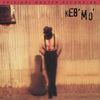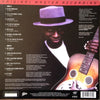



Keb’ Mo’ - Keb’ Mo’ (Ultra Analog, Half-speed Mastering)
ORDER LIMITED TO ONE ITEM PER CUSTOMER
Keb’ Mo’, vocal, guitar, harmonica & banjo
Tommy Eyre, keyboards
James “Hutch” Hutchinson, bass
Laval Belle, drums
Quentin Dennard, drums on “Angelina”
Tony Draunagel, percussion on “Come On In My Kitchen”
1 LP, standard sleeve
Limited numbered edition
Original analog Master tape : YES
Half-speed Mastering
Gain 2™ Ultra Analog
Heavy Press : 180g
Record color : black
Speed : 33 RPM
Size : 12'’
Stereo
Studio
Record Press : RTI
Label : MOFI
Original Label : Epic
Recorded by Joe McGrath and by John Strother at Penguin Recording and Devonshire Studios
Mixed by Joe McGrath at Red Zone Studios, Burbank, CA
Produced by John Porter
Remastered by Krieg Wunderlich at Mobile Fidelity Sound Lab
Photography by Frank W. Ockenfels
Originally released in 1994
Reissued in 2011
Tracks:
Side A :
2. Tell Everybody I Know
3. Love Blues
4. Victims Of Comfort
5 Angelina
6. Anybody Seen My Girl
Side B :
3. Come On In My Kitchen
4. Dirty, Lowdown And Bad
5. Don’t Try To Explain
6. Kindhearted Woman Blues
7. City Boy
Reviews:
« Keb' Mo's self-titled debut is an edgy, ambitious collection of gritty country blues. Keb' Mo' pushes into new directions, trying to incorporate some of the sensibilites of the slacker revolution without losing touch of the tradition that makes the blues the breathing, vital art form it is. His attempts aren't always successful, but his gutsy guitar playing and impassioned vocals, as well as his surprisingly accomplished songwriting, make Keb' Mo' a debut to cherish. » AllMusic Review by Thom Owens
Ultra Analog™ : The GAIN 2 Ultra Analog™ Series stems from the use of the Gain 2 system, mastered at half speed from the original master tapes where possible, capturing and uncovering as before undiscovered sonic information.
Half-speed mastering. In half-speed mastering, the whole process is slowed down to half of the original speed. A typical 33 1/3 rpm record is cut at 16 2/3 rpm. The source material is also slowed down (reducing the pitch in the process) meaning the final record will still sound normal when played back. Slowing the whole process down allows more time, which means the end result sounds better and is more efficient — allowing engineering to minimize the effects of inherent limitations within the vinyl format. The result is a more accurate and more open high-frequency response in the half speed vinyl when compared with a normal speed recording.
Ratings :
AllMusic : 4 / 5 , Discogs : 4.39 / 5



